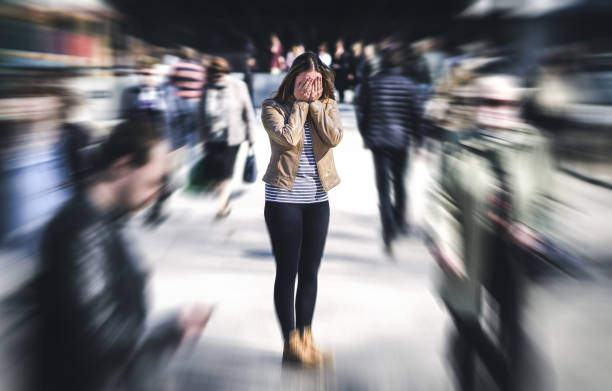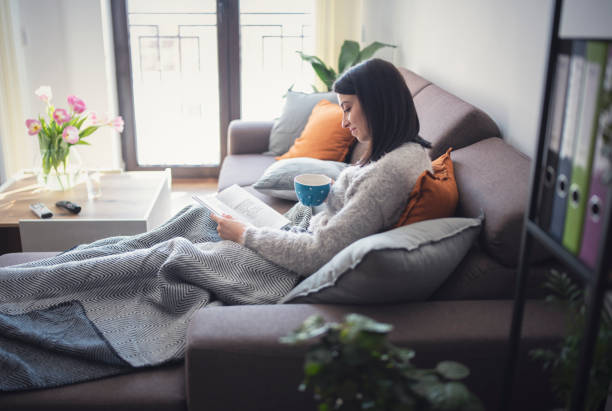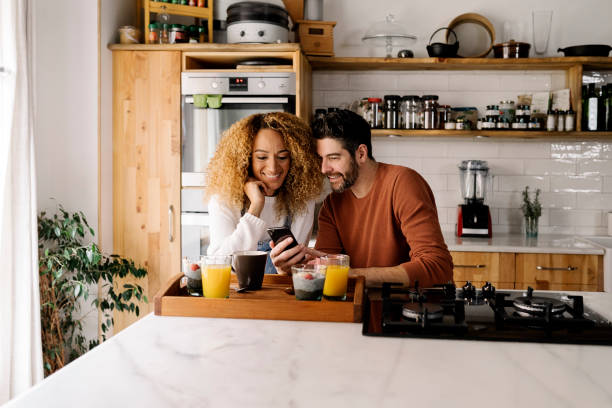
In a world that seems to be constantly buzzing with social interactions, it’s not uncommon for individuals with social anxiety to experience a unique challenge – the depletion of their social batteries. Social anxiety can turn everyday interactions into energy-draining endeavors, leaving one feeling exhausted and overwhelmed. Social anxiety can very quickly create situations of social isolation, where it just seems “easier” to avoid interactions altogether than to try to navigate and negotiate social output. The more one avoids these situations, the more intimidating they become, perpetuating loneliness and frustration.
Even for individuals who do not experience social anxiety, there is a limit to how much socialization most people can experience without some sort of compromise. We live in a society very much shaped by our ability to be “on-call”; there is an expectation of communication, whether it be between friends, with our place of employment, or among family members. The idea of disappearing for a while to recharge is almost non-existent. We exist in social overdrive. This can be very harmful to our mental and physical health.
What is Social Anxiety?

Social anxiety, also known as social phobia, is more than just shyness; it’s an intense fear of being judged, criticized, or rejected in social situations. Those grappling with social anxiety often experience physical symptoms like a racing heart, sweating, trembling, and an overpowering desire to escape social settings. The fear of negative evaluation becomes a constant companion, making seemingly simple social interactions a source of significant distress. Because we provide therapy for social anxiety in Woodland Hills, we see and hear from patients of all ages and backgrounds who experience social anxiety and the fatigue that comes with it.
3 Things To Do When Your Social Battery Runs Out
1) Embrace Self-Compassion:

Understand that everyone, regardless of their level of social anxiety, needs moments of solitude to recharge. Instead of berating yourself for needing a break, acknowledge your emotions without judgment. Take a step back, breathe, and remind yourself that it’s okay to prioritize your well-being. You are not obligated to try to “keep up” with anyone else; you have your own needs, your strengths, and struggles. Being hard on yourself won’t make it any easier for you to navigate how you are feeling or take steps toward your goals.
Self-compassion isn’t solely reserved for those moments when you reach your limit. It is a great practice to have all the time so that you are used to it. Trying to show yourself compassion when you are out of practice with it and under duress isn’t going to be as straightforward as if it were a natural habit. Self-compassion looks like speaking kindly to yourself about mistakes and missteps and experiencing negative thoughts and emotions. Affirmations are straightforward sentences that you can say, write, or think to yourself to reinforce your ideals and support your mental wellness. A self-compassionate affirmation might be, “I am doing better than my worst,” or, “I don’t have to be great at this right now.” Ideally, you can find an affirmation that reminds you that you are human and that it is impossible to be “perfect.”
Social anxiety can be elevated when we don’t feel confident in ourselves. Insecurity and shame make a great cooperative team, feeding and exacerbating one another. We ruminate on past missteps and berate ourselves for them. This self-perpetuating state of mind contributes heavily to a fear of failure; it seems like a foregone conclusion. Being kinder to yourself overall will help you to raise your self-esteem. Yes, it makes sense if you become nervous about socializing when the stakes are high, such as when you are in the company of your employers or on a date. However, self-compassion tells you not to talk down to yourself about your anxiety but rather to validate your experience. “My nerves tell me that I care about this; it is a natural human experience to care. I am confident even if I am nervous.”
Suppose you find that you have to exit situations because you’ve drained your battery or know you are close to doing so, speak to yourself kindly about it. “I am allowed to rest,” “These people and I both deserve to experience a version of me who is happy to be here,” and “Everyone has different experiences and limits” are great reminders when you are trying to decide if it’s time to go, or if you are feeling guilty after you’ve left.
For many of us, it is hard to feel compassion for ourselves when we are not caring for ourselves. Ensure that you have a self-care routine that supports your overall wellness. Self-care can be provided in a range of ways, from basics like eating, sleeping, hydrating, and moving your body to staples like journaling and meditation, participating in activities you enjoy, connecting with people you love, and treating yourself to special events like a trip to a theme park or a spa day. There might be days when your battery is so low you can barely manage to take a shower. On those days, showering is self-care.
2) Create a Safe Space:

Having a predetermined sanctuary allows you to manage your energy levels proactively. When you feel overwhelmed, escape to this safe space to regroup, reflect, and regain the mental clarity needed to face social situations more confidently. This safe space is also an excellent place to visit before you become overwhelmed; proactive rest can go a long way toward preventing burnout.
You may attend social anxiety therapy in-person or online and find that this is a safe space for you to be. Sometimes, just knowing that you will have a session coming up helps to keep you focused on handling your stressors. It is also important to have safe spaces you can access at any time of day or in any situation where therapy is ultimately utilized as a supplemental safe space.
Determine what a safe space means for you. Is it a place where you can guarantee privacy? Is it a space with reduced sensory stimuli, such as a quiet and/or dark room in your home? Do you leave your electronics outside this space so you cannot be disturbed, or put them on a Do Not Disturb mode? Do you listen to meditations in this space? How does this space support your overall health; is there food and water there? Hopefully, your home is a safe space for you. If it isn’t, then investigating why that is can help you determine your needs. Everyone deserves to be able to come home and feel themselves immediately relaxed. If you live with someone who seems to be destabilizing you, consider if that person has habits that need to be addressed or if something else is going on. If you are interrupted or overtaken by children, what is the solution? Do you feel that your space is cluttered or untidy in a way that makes you anxious; how do you solve that problem?
Visit your safe space as often as you need to. Consider what makes it a safe space for you. Some people use their vehicles as safe spaces because they can be alone, listen to music, and feel independent. Some people use a room or area of their homes as their safe space because they can be still and tune out the rest of the world. Some have more than one safe space and supplement a space they always have access to with nearby parks, coffee shops, galleries, museums, libraries, and so forth.
It is helpful to have a medium when you are regrouping, reflecting, and regaining your mental clarity. You might choose to journal, speak aloud about your experience, or even connect with an online support group. Finding a way to express your feelings and experiences is what counts. As long as you are in control of your privacy and feel secure, you succeed.
Your safe space doesn’t exist solely for the purpose of re-calibrating but for regular maintenance as well. If you only ever go there when you are triggered, exhausted, or overwhelmed, it will not be as helpful, and it also might not feel like such a safe space anymore. Supplement your daily plans with visits to your safe space; take time to reflect and connect with yourself even on days when you haven’t reached your limit. It doesn’t have to be daily if that’s impossible for you. But anything you practice regularly contributes to lessening stress overall and feels more familiar to turn to when you need it.
3) Establish Boundaries:

Whether limiting the duration of social engagements, excusing yourself when needed, or expressing your needs to friends and family, establishing boundaries empowers you to maintain a healthy balance between social interaction and personal space. You may utilize Cognitive Behavioral Therapy (CBT) to identify thoughts and behavior patterns that contribute to your struggles and figure out how to course-correct. CBT is used to treat many mental health issues and disorders. CBT for social anxiety may help you uncover areas in which you are not asserting the boundaries you need.
Properly utilizing boundaries goes a long way toward preventing you from reaching the end of your rope. The number one reason people experience social fatigue is because they have ignored their limits. Most of us have an idea of what our limits are when we encounter them; we feel the dread set in when we think about our plans, or we experience nausea and/or pain from the stress. The trick is to take control of your schedule and your anxiety to the point where you are rarely caught in the middle of an engagement and realize that you need to leave.
Even with social anxiety, we can still experience a fear of missing out if we leave an event before others do. This can lead to us being hard on ourselves about our limitations or overstaying and regretting it later. A great way to check in with yourself is to affirm that you are capable of having a good time and be honest about how that looks for you. Frame and accept your plan to attend a social activity as going for the amount of time that it’s fun and leaving before you’re unhappy. “I deserve to have a good time; I can likely enjoy myself for two hours, then I will go home.” Or you might say, “I know my body and mind; when I start to feel social fatigue set in, I will take care of myself and go home.” Many of us have reflected on nights that went downhill and thought, “I should have just left at ten.” If you’re mentally and emotionally done with an experience, remind your FOMO that you won’t be able to make the most of your time, anyway. You’re only missing out on stressing your nervous system and neglecting your self-care.
If you’re not confident about how to exit, you might want to recruit a buddy. You may do this beforehand by talking to someone who will also be in attendance and explaining that you need support. Or you may ask someone who isn’t coming along to contact you at a certain point in the day to remind you that it’s okay to leave. Sometimes, we have the hardest time dealing with events hosted by the people we love most. Can you go to the host in advance and explain your goals and intentions? “I am so excited to celebrate you on the 17th! Because I want to have a great time and contribute to the energy in a positive way, I have to leave before my social battery runs out. Is there a two-hour window in the festivities most important for me to participate in for you?” You have every right to ask people who care about you to respect and care for you, and that’s what boundaries are for.
Even with the most consistent self-care routine and therapy for social anxiety, you will still encounter times when your social battery runs out. You might be in the middle of a busy event and feel over-stimulated, or you might have had to expend too much social output over the past while. Sometimes, you’ll be able to see in advance how a situation might be challenging for you. Other times, you’ll be surprised by how suddenly you realize you must exit the situation. Regardless of the circumstance, understand that your social battery is not a moral failing. All you can do is your best to prioritize and show up for the things that matter. Everyone has a different capacity for socialization, and everyone has a different need for social contact. We are all individuals in many ways, and this is just one of them. Be kind to yourself as you work toward understanding your limits, challenging your preconceptions, and adjusting your thought process about your social anxiety.
Social Anxiety Therapy in Woodland Hills
While we are wired for social connection, we can all vary in our preferences where some of us thrive in big groups, while others prefer smaller, more intimate gatherings. No matter the preference, if you feel like your anxiety has been hijacking your confidence in social situation, Social Anxiety Therapy with our CBT therapists can help you find the best tools to tame your anxiety. Because social anxiety is more than just some nerves. Contact us today for your complimentary 20-minute phone consultation with our Admin Team today!




